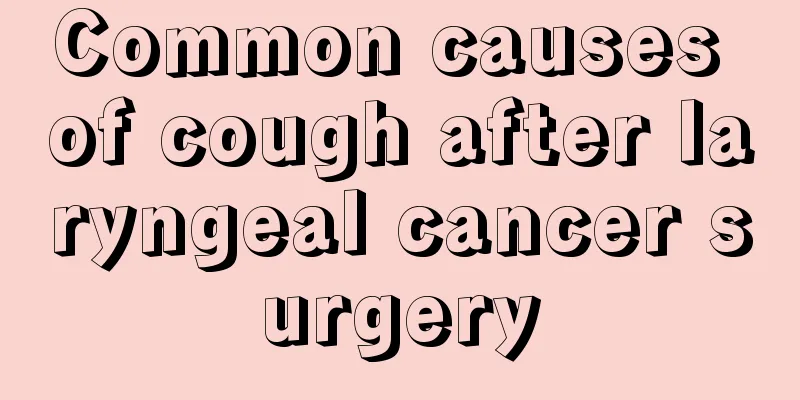Common causes of cough after laryngeal cancer surgery

|
Patients with laryngeal cancer may also experience a series of complications after surgery to remove the tumor. Coughing is one of the common symptoms. Frequent coughing is not conducive to wound healing and can also disturb the patient's mood. There are three main factors that cause patients to cough frequently after surgery. 1. Respiratory secretion factors Tracheotomy and fistula after laryngeal cancer surgery changes the integrity of the normal respiratory tract, the function of the respiratory mucociliary membrane changes, and the secretions increase. In the early postoperative period, patients are afraid to forcefully sputum due to wound pain and other factors. Sputum accumulates and forms scabs, which irritates the tracheal wall and causes coughing. Obvious sputum sounds or noises inside the cannula can also be heard. 2. Tracheal tube factors After tracheotomy, patients often feel uncomfortable when wearing the cannula for the first time, which causes some irritation to the trachea and causes irritating dry cough. Some cases are caused by the cannula being too large or too curved, causing the distal end of the cannula to collide with the anterior wall of the trachea, which causes coughing. The main manifestations are induced or postural coughs, often accompanied by blood in sputum. Severe coughs can sometimes be relieved by replacing the appropriate cannula or adjusting the tightness of the cannula tie. 3. Mucosal incision suture During vertical hemi-laryngectomy and middle laryngectomy, due to surgical interference, mucosal edema, inflammatory reaction, etc., the mucosal sense reaction is slow, saliva swallowing is difficult, and it is easy to cause aspiration, and choking and coughing are inevitable. In more obvious cases, there is an itchy feeling in the throat and a foreign body sensation. Mucosal trauma and absorption of thread head stimulation can also cause patients to cough violently. In this case, patients should try not to cough vigorously to avoid affecting wound healing. They should follow the doctor's advice to use appropriate antitussive drugs to control coughing. |
<<: 3 kinds of TCM special treatments for lymphoma
>>: Several foods suitable for pancreatic cancer patients to eat
Recommend
Is it good to soak wolfberry in wine for external use
Many people use wolfberry to soak in wine. Many p...
How to prevent recurrence after colostomy surgery for rectal cancer
How to prevent recurrence after ostomy surgery fo...
Is it normal that my heart rate is around 60 when I am at rest?
The heart rate actually needs to be determined ac...
Long-term dull pain around the navel
Pain in any part of the body needs our attention....
Take birth control pills a few hours after sex
If you do not take contraceptive measures during ...
What are the symptoms of hamartoma
Hamartoma is very harmful to people, but many peo...
What vitamins do tomatoes contain
Nutritional Information Tomatoes are rich in caro...
What are the ways to prevent lung cancer? Five ways to prevent lung cancer from happening
Lung cancer is a common malignant tumor, so the p...
Detailed explanation of the causes of teratoma
Physical health is the most basic condition for o...
Is it more fertile in the morning or at night?
Many couples worry about not being able to get pr...
Can I eat pineapple if I have high blood sugar? What are the benefits?
Pineapple is the most common fruit in March and A...
What are the different types of lip shapes
Among our five senses, lips are the organ that be...
What is the treatment plan for advanced laryngeal cancer
Laryngeal cancer usually requires reasonable trea...
Don't massage the lymph nodes easily
People's lymphatic system is able to detoxify...
Is colon cancer contagious by eating together
Due to irregular lifestyles, environmental pollut...









